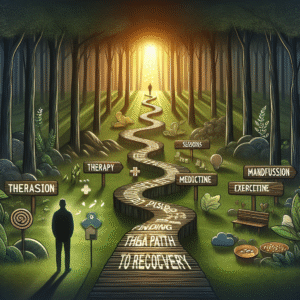It’s easy to feel overwhelmed these days. The constant ping of notifications, crowded schedules, endless scrolling—it’s no wonder so many of us feel anxious, worn out, or just emotionally flat. But there’s a simple, often overlooked remedy that can make a real difference in how we feel: time spent outdoors. Nature therapy, as some call it, isn’t a trend or a cure-all. It’s more like a homecoming—a return to something deeply familiar, comforting, and real.
You don’t need to hike into the wilderness to feel the benefits. A quiet stroll through a neighborhood park or even sitting under a tree with your phone off can do the trick. As it turns out, just being around greenery and fresh air can make a measurable impact on mental health, and it’s backed by more than just good vibes.
Stress Melts Away in Green Spaces
One of the first things people tend to notice after spending time outside is how their body relaxes. Shoulders drop, breathing slows, and that heavy mental fog starts to lift. There’s actual science behind this. When we’re surrounded by trees, plants, and natural sounds, our stress hormones—like cortisol—tend to drop. Our heart rate slows down. Blood pressure evens out. It’s as if nature is gently whispering, “You’re okay. Just breathe.”
A simple 20-minute walk in a green area a few times a week has been shown to significantly lower stress levels. You don’t need to be climbing mountains—just being in a calm, natural setting is enough to quiet an overstimulated nervous system.
Nature Helps Balance Your Mood
Have you ever noticed how your mood improves after a walk in the park, even if nothing in your life has changed? There’s something powerful about open skies, sunlight filtering through leaves, or birdsong echoing through a quiet trail. Exposure to daylight naturally boosts serotonin—the brain chemical that helps regulate mood and promotes feelings of well-being.
Beyond the biology, nature provides a space for emotional release and reflection. It’s not just that you feel “happier” in nature. You might also feel more grounded, less reactive, and more in control of your emotions. There’s a quiet sort of clarity that comes with being outdoors, one that helps you process feelings without needing to analyze everything to death.
A Natural Support for Depression
While nature therapy isn’t a replacement for professional help when dealing with depression, it can be a valuable part of a bigger healing picture. Studies have found that people who regularly spend time in green spaces tend to report fewer symptoms of depression. One particular study even found that walking in a natural setting helped lift depressive moods more effectively than walking in urban areas.
There’s also something to be said about how nature can help us shift perspective. When you’re surrounded by something larger than yourself—like a vast forest or a peaceful ocean—it can gently pull you out of your head and into the present moment. That sense of awe and connection helps remind us that we’re not alone, even when things feel dark.
Sharpening Focus and Restoring Attention
Modern life is noisy. Between emails, group chats, and social media, our attention is constantly pulled in a dozen directions at once. Over time, that kind of mental strain adds up. Nature offers a reset.
Researchers have found that spending time in natural settings helps restore our ability to focus. It gives the brain a break from the kind of hard, directed attention we use all day—like reading emails or navigating traffic—and replaces it with what’s called “soft fascination.” Think of watching clouds drift by or leaves sway in the breeze. Your mind is gently engaged, not bombarded. After even a short time outside, people tend to return to their tasks more refreshed, alert, and focused.
Building a Sense of Connection
Nature doesn’t just help us feel better mentally—it also has a way of making us feel more connected. To the earth, to others, and even to ourselves. In green spaces, people are more likely to smile at each other, chat with strangers, or just feel a bit more at ease in their own skin.
There’s something deeply healing about the quiet companionship of the natural world. Whether it’s the rhythm of waves, the stillness of a snowy path, or the rustle of leaves in the wind, nature gives us space to just be. Without judgment. Without pressure. Just presence. And that feeling of belonging—to something ancient and vast—is powerful medicine for the soul.
Easy Ways to Invite Nature In
The beauty of nature therapy is that it doesn’t require fancy gear or faraway destinations. There are simple ways to bring more of the outdoors into your life:
- Take a daily walk outside, even if it’s just around your block.
- Spend your lunch break in a nearby park instead of eating at your desk.
- Start a small garden, or keep a few plants on your balcony or windowsill.
- Go barefoot in the grass once in a while—yes, really.
- Try “sit spot” meditation—pick one spot outdoors and spend 10–15 minutes there a few times a week. Just observe, without doing anything.
You don’t have to go off the grid to get the benefits. What matters most is being present, consider putting the phone down, breathing in the air, and letting yourself really take in your surroundings.
In many ways, nature therapy isn’t about doing something new. It’s about remembering something old—something our bodies and minds already know. That we feel calmer near trees. That we think more clearly when we’ve had some sun on our face. That we need beauty, quiet, and open space just as much as we need food and water.
As mental health conversations continue to evolve, nature deserves a seat at the table—not just as a feel-good suggestion, but as a legitimate part of how we care for ourselves. So the next time life feels overwhelming, don’t just tough it out. Step outside. Listen to the wind. Let the world remind you that healing doesn’t always come in a bottle or a screen—sometimes, it comes in the form of sky and soil and stillness.






